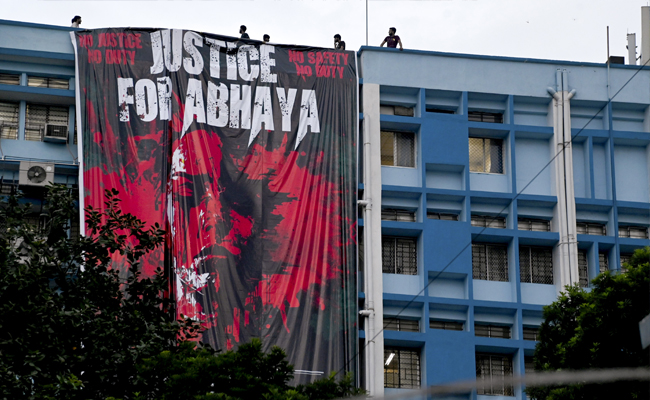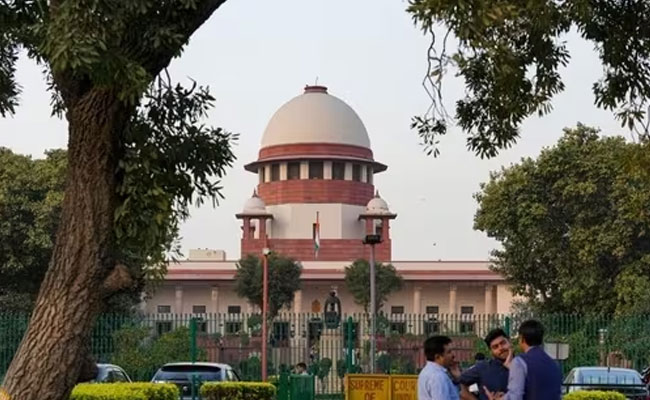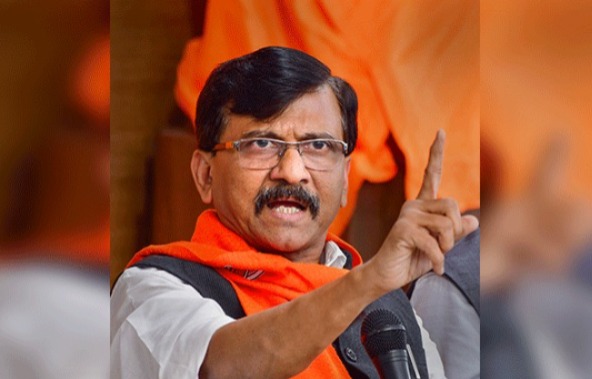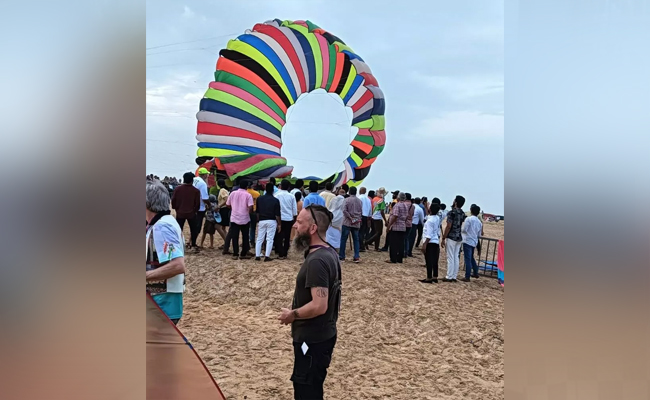Kolkata (PTI): Amid tight security arrangements, Sanjay Roy, who has been convicted of raping and murdering an on-duty doctor at the state-run R G Kar Medical College and Hospital, was brought to a court here on Monday for pronouncement of the sentence, police said.
Flanked by multiple police vehicles, Roy was brought out of jail around 10.15 am.
The Sealdah court has been fortified with nearly 500 policemen deployed and the authorities left no stone unturned to prevent any untoward incident, an officer said.
Despite the heavy police deployment, many people thronged the court premises and some were seen attempting to climb railings to catch a glimpse of the convict.
The parents of the deceased doctor, who were on their way to the court, said they trusted the judiciary to deliver justice.
“We have faith in the judge,” said the victim’s father.
The deceased doctor's mother, however, expressed disappointment with the CBI investigation, alleging that "other perpetrators involved in the crime had not been brought to justice".
“Only one person is not involved in the crime, yet the CBI has failed to apprehend the others. Such criminals have no right to live if we are to prevent future crimes in society,” the bereaved mother said.
The rape-murder of the doctor, which occurred on August 9 last year, had sparked nationwide outrage and prolonged protests.
Roy, a former civic volunteer with the Kolkata Police, was arrested a day after the incident, and the case was later transferred to the Central Bureau of Investigation (CBI).
Found guilty of sexually assaulting the doctor and throttling her to death, Roy was convicted by the judge under Sections 64, 66 and 103(1) of the Bharatiya Nyaya Sanhita (BNS).
Section 64 (rape) of the BNS entails a punishment of not less than 10 years and can go up to life term. Section 66 (punishment for causing death or resulting in a persistent vegetative state of the victim) provides for a punishment of not less than 20 years that may extend to imprisonment for life, which shall mean imprisonment for the remainder of that person's natural life, or with death.
Section 103(1) (murder) of BNS provides for the death penalty or imprisonment for life to a person convicted of the crime.
Judge Anirban Das of the Additional District and Sessions Court, Sealdah will hear Roy’s statement at 12:30 pm on Monday before pronouncing the quantum of punishment.
Let the Truth be known. If you read VB and like VB, please be a VB Supporter and Help us deliver the Truth to one and all.
New Delhi (PTI): The Supreme Court on Monday said it was pained to see a man move the top court to bury his father as per Christian rites in a Chhattisgarh village after the authorities failed to resolve the issue.
A bench of Justices B V Nagarathna and Satish Chandra Sharma was hearing a plea filed by one Ramesh Baghel, challenging an order of the Chhattisgarh High Court which disposed of his plea seeking burial of his father, a pastor, in the area specified for the burial of Christians in the village graveyard.
"Why should a person who has lived in a particular village be not buried in that village? The body is lying in the morgue since January 7. Sorry to say that a man has to come to the Supreme Court for burial of his father. We are sorry to say that neither the Panchayat, nor the state government or the high court was able to resolve this problem. We are surprised by the high court's remark that there will be law and order problem. We are pained to see that a person is unable to bury his father and has to come to the Supreme Court," said the bench.
Baghel said while villagers had "aggressively objected" to the burial, police threatened him with legal action.
At the outset, solicitor general Tushar Mehta, appearing for the state government, informed the court that there was no burial ground for Christians and the man could be buried in a place 20 kilometer away from the village.
Senior advocate Colin Gonsalves, appearing for Baghel, said the affidavit submitted by the state showed his family members were also buried in the village.
Referring to the affidavit, Gonsalves said the deceased was not being allowed the burial as he was Christian.
Mehta said the son was adamant to bury his father in the burial ground of his family's native village to create unrest between tribal Hindus and tribal Christians.
Opposing the submission, Gonsalves said this was the "beginning of movement to kick Christians out".
Mehta said the issue should not be decided on emotions and was ready to argue the matter in detail.
The top court posted the hearing on January 22 after the Mehta sought time.
Relying on a certificate issued by the gram panchayat's sarpanch that there were no separate burial grounds for Christians, the high court denied the permission for burial to the son underlining it could cause unrest and disharmony in the public at large.
The pastor died due to old age.
According to Baghel, Chhindawada village had a graveyard which was verbally allotted by the gram panchayat for burial and cremation of bodies.
In the graveyard, separate areas were demarcated for burial of tribals; burial or cremation of people belonging to Hindu religion and for persons belonging to the Christian community.
In the area specified for Christians, the petitioner's aunt and grandfather were buried in this village graveyard.
The plea said the petitioner and his family members wanted to hold the man's last rites and bury his mortal remains in the area specified for Christian persons in the graveyard.
"Hearing of this some villagers aggressively objected to it and threatened of dire consequences if the petitioner and his family buried the petitioner's father in this land. They are also not allowing the petitioner's family to bury the mortal remains in the petitioner's family privately-owned land," it said.
According to Baghel, the villagers said a Christian couldn't be buried in their village be it the village graveyard or even a privately-owned land.
"When the villagers turned violent, the petitioner's family made a report to police following which 30-35 police personnel reached the village. The police also exerted pressure on the family to take the body out of the village," he said.




